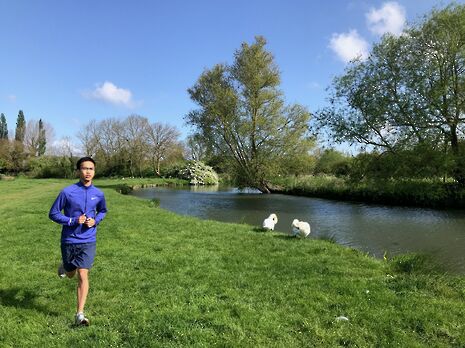‘I was scared of being judged’: fresher musings on a year of sport
On a mission to connect with his own sporting experiences, Michael Nguyen-Kim asked fellow freshers about their experiences in the University sport scene

Coming to Cambridge, I adopted a targeted approach when it came to sport. I was tempted to try out many different activities, but in the end I opted for one particular sport - rowing.
For many other freshers, however, the choice to engage in sport wasn’t so straightforward. With so many sports to choose from, and so many other commitments on our time, it can be difficult to decide how to integrate sport into our lives.
So I embarked on a journey to speak to a number of fellow freshers to gain a better understanding of what impacted their sporting choices in their first year of university, and what they would have done differently given another chance. Here's what I found.
'I was scared of being judged'
One of the great forces that stops people from realising their dreams is the fear of humiliation - especially in sport. Ella*, who studies Law, considered taking up rowing at the start of Michaelmas. Being of slight build, she thought she could make a good fist of learning to be a cox. Her enthusiasm quickly waned, however.
“I came to the boat club reception and it all seemed really masculine, which sort of put me off,” she said. “I was [also] scared of screwing up or making a mistake, because that’s humiliating.”
A year’s worth of wisdom has, however, given her a fresh perspective on her aspirations. “Sure it can be humiliating when you make a mistake but mistakes are always going to happen…you just have to be able to deal with it."
Although still slightly apprehensive about the growing pains of adjusting to a new sport, Ella has decided that she will take the plunge and sign up for rowing next year. She considers herself fortunate to have realised the impact that fear had on her at a relatively early stage in her university life.
“It’s definitely better that I’ve realised now instead of finishing my degree and regretting not having done stuff.”
'There are not enough hours in the day'
The difficult academic environment coupled with the intensity of eight-week terms means that students here have less time to devote to sport than at other universities.
"I came to the boat club reception and it all seemed really masculine, which sort of put me off"
Many are clearly unwilling to sacrifice their academic performance for the sake of sport. CJ* began rowing as a novice in Michaelmas. His involvement was influenced by academic considerations from the outset, signing up for the third novice boat because it had the fewest weekly outings. He dropped rowing altogether in Easter term, citing the need to do well in his exams: “I really want to get a first, and I’m not willing to let rowing get in the way of that… there are not enough hours in the day”.
Others, however, tell me how sport has actually benefited their academic performance. Alex, a fresher at Trinity, is a former competitive long-distance runner who still tries to go for a jog every day, usually towards Grantchester or another nearby village. As far as he’s concerned, a healthy body equals a healthy mind: “It feels so good after [going for a run]…your mind is just refreshed.”
'I was never very good at sport'
Growing up in Australia, I was involuntarily exposed to a steady diet of cricket, football, rugby and, of course, Aussie rules. I loved watching my heroes on TV and religiously scanned the back pages every morning as soon as the paper arrived on the doorstep.
Although I had a go at most of the above sports at one point or another, I never became much good at any of them. One reason was the fact that I switched sports too often – wanting to try as many sports as possible, I never really gave myself time to develop expertise in any particular one.
"I really want to get a first, and I’m not willing to let rowing get in the way of that"
Another problem was my lack of physical gifts. I was always a fairly small kid, which put me at an immediate disadvantage in almost any sport I cared to play.
Finally, my parents never valued sport in the same way they valued study, and I was conditioned to view sport as an ‘optional extra’ in life as opposed to an integral part of it.
When I arrived at Cambridge I was determined to specialise in one sport rather than spreading my efforts too thin. I deliberately chose a particular one (rowing) and stuck to it. Even in unpleasant moments (6am wakeups in the freezing dark at the beginning of Lent spring to mind), I persisted as I knew there would be no other way to improve. To compensate for my lack of size, I adopted a weights and cardio training program over the breaks, which I had never done before in my life.
For me, first year allowed me to correct some of the mistakes I had previously made in my approach to sport. I am now fitter than I have ever been and feel a genuine sense of belonging with the teammates in my crew.
'I did it for the free drink'
However in my explorations for this piece, I noticed an interesting trend - most of the freshers’ I spoke to who were involved in sport were rowers, most of whom had signed up for the first time at the beginning of University. Are freshers being unduly influenced by rowing’s hegemony?
The recent May Bumps races involved over 1500 competitors, or around 10% of the total student population. Scores of freshers, including myself, take up rowing instead of other sports in part because of the generous exposure of rowing and its connection with our preconceptions of Cambridge. Most boat clubs hold events during Freshers’ Week in which first-years are encouraged to sign up. In my case, I was offered a token to exchange for a drink at the bar in return for putting my name down for a tubbing session.
Yet one of the most common attractions of rowing from those I interviewed was the sense of camaraderie that came from the sport’s especially high intake. I found that learning a complete new sport alongside so many different people enabled me to forge a unique bond with other rowers, as we could relate to one another’s experiences and struggles throughout those dark mornings.
'I just love it'
Most of the reasons people give me for doing sport are obvious; common refrains include a desire to "get fit", or to "meet new people". However I can’t help but feel that underneath these platitudes their passion stems from something more fundamental.
My friend Sam, who rediscovered his love for motorsport at Cambridge, lights up when I ask him about his upcoming karting races. Sam signed up for the Automobile Club at the Freshers’ Fair and has been regularly competing in races around the country since Michaelmas. His one wish when he graduates is to get a job that will earn enough to enable him to spend his weekends racing. Sam’s enthusiasm for motorsport cannot be fully explained through its social or physical benefits. He simply enjoys driving cars. It is a passion that will stay with him for life.
The final person I interview, another rower, encapsulates this passion with ease. Despite studying a demanding degree with many contact hours and being involved in multiple extra-curricular pursuits, she finds the time to row multiple times each week and spent a term in her college’s W1 crew, despite only having started rowing at University. Like Sam, she would like to continue her sport of choice into her adult years. When I ask her why she rows, she smiles gently. “I just love it”, she says.
*Some names have been changed
 News / Caius mourns its tree-mendous loss23 December 2025
News / Caius mourns its tree-mendous loss23 December 2025 Comment / Yes, I’m brown – but I have more important things to say22 December 2025
Comment / Yes, I’m brown – but I have more important things to say22 December 2025 News / Clare Hall spent over £500k opposing busway 24 December 2025
News / Clare Hall spent over £500k opposing busway 24 December 2025 Interviews / Politics, your own way: Tilly Middlehurst on speaking out21 December 2025
Interviews / Politics, your own way: Tilly Middlehurst on speaking out21 December 2025 News / King appoints Peterhouse chaplain to Westminster Abbey22 December 2025
News / King appoints Peterhouse chaplain to Westminster Abbey22 December 2025









